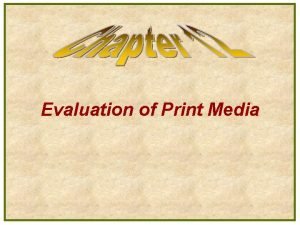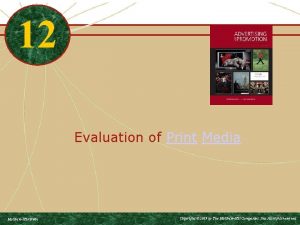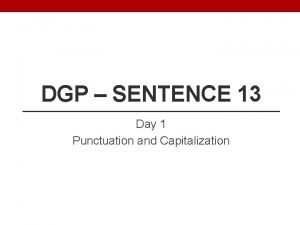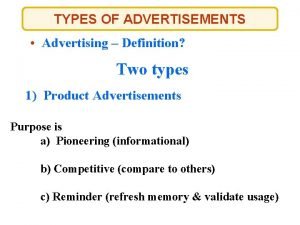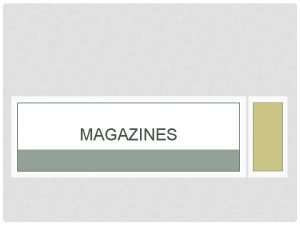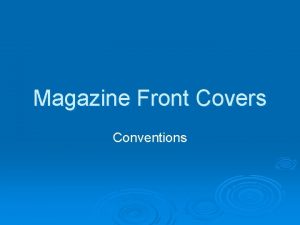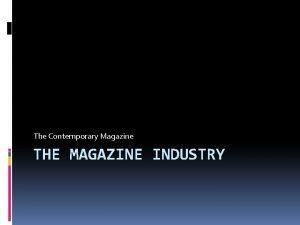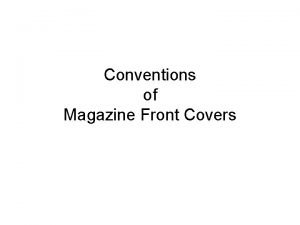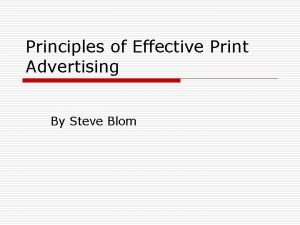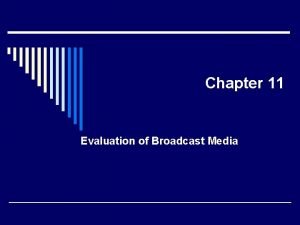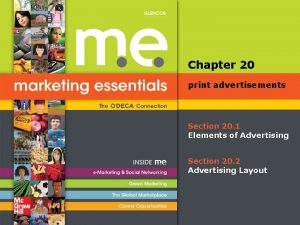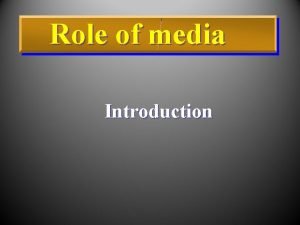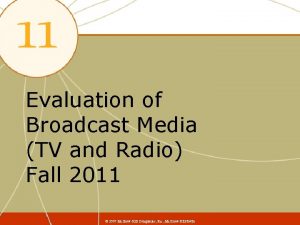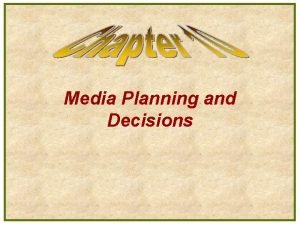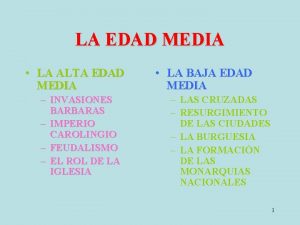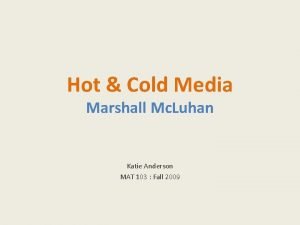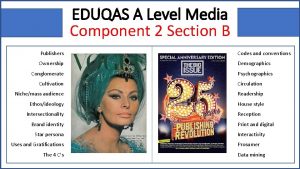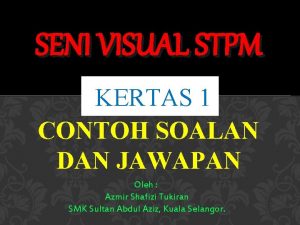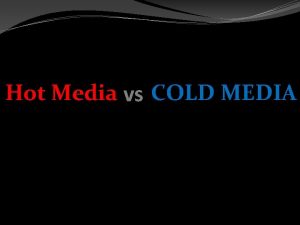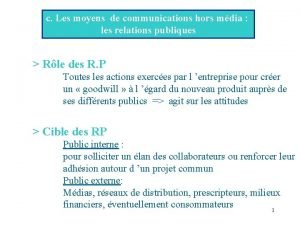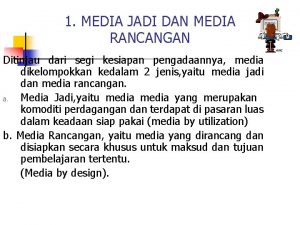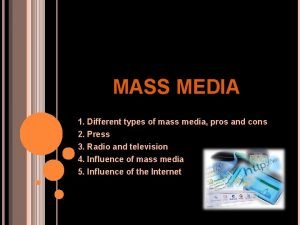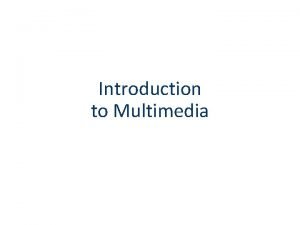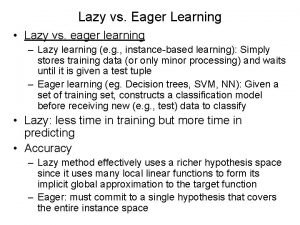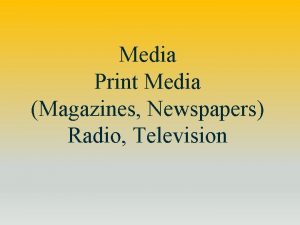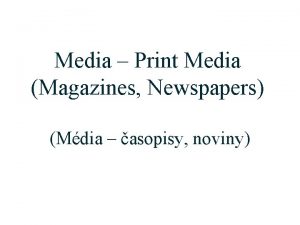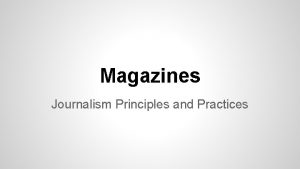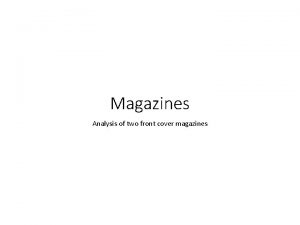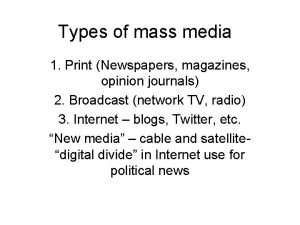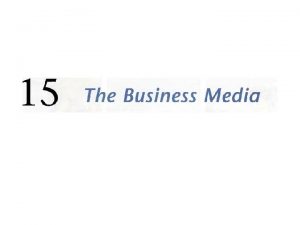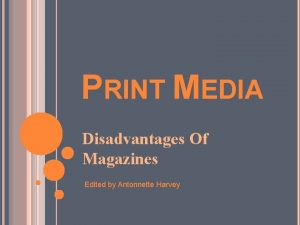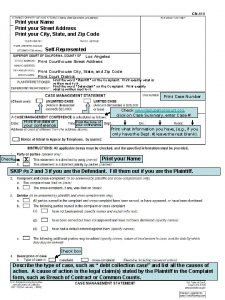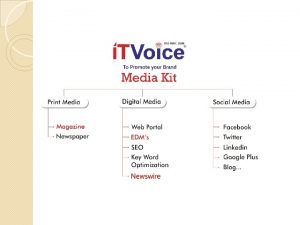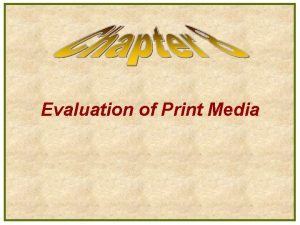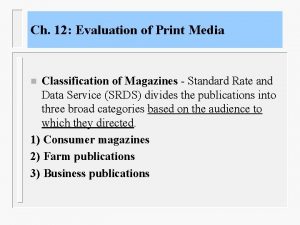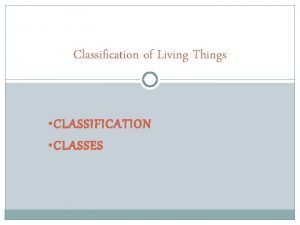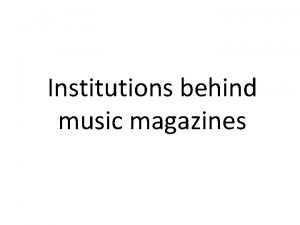Evaluation of Print Media Classification of Magazines l











































- Slides: 43

Evaluation of Print Media


Classification of Magazines l l l Consumer magazines Business publications Farm publications

Consumer Magazines l l Provide the general public for information or entertainment. More detailed classification: general editorial, sports, travel, and women’s. Distribution: subscription (circulation), store distribution, or both. Frequency: weekly, monthly, and bimonthly.

Consumer Magazines l l l Accounting for nearly 2/3 of all advertising dollars spent in magazines. Top 25 consumer magazines account for 70% of all advertising dollars spent in consumer magazines. Pros: specific market segment, favorable advertising environment, less legal constraints.

Business Publications l l l Published for specific business, industries, or occupations Vertical publication & horizontal publication Classifications l l l Specific professional groups, e. g. National Law Review, Architectural Forum. Industrial magazines, e. g. Iron and Steelmaker, Chemical Week, and Industrial Engineering. Trade magazines, e. g. Progressive Grocer, Drug Store News. General magazines, e. g. Forbes, Fortune, and Business. Week. Health care publications

Farm Publications l l l Farm publications are not classified with business publications because historically farms were not perceived as business. About 3, 00 publications are tailored to nearly every possible type of farming or agricultural interest. SRDS breaks farm publications into 9 classifications, ranging from general-interest magazines aimed at all types of farmers to those in specialized agricultural areas such as poultry, hot farming, or cattle raising.

Magazine Readership Measurement l l Circulation Traditional delivery Nontraditional delivery (controlled circulation) The Audit Bureau of Circulation (ABC), e. g. 中華民國發行公信會.

Advantages of Magazines l Market selectivity l l Interest, e. g. selective binding. Demographic: editorial content or special edition. Geographic selectivity: magazine that is targeted toward a particular area, or specific geographic editions of national or regional magazines. Ink-jet imaging

Advantages of Magazines l Creative flexibility l l l l Double page spread (跨頁廣告) Bleed pages (全版廣告): extra 10~20% for bleeds. Gatefolds (折頁) Photo essay Frictional page space Unusual page sizes and shapes, e. g. 3 D立體圖. Inserts (插頁), e. g. coupons or samples. Creative space buys, e. g. WD-40多用途潤滑油.

WD-40

Advantages of Magazines l Permanence l l l The format of short essay is easy to read anytime, e. g. readers devote nearly an hour over a period of two or three days to reading an average magazine. Long life span, e. g. 75% of consumers retain magazines for future reference. Less hurried pace and more opportunity to examine ads in considerable detail.


Advantages of Magazines l Reproduction quality l l Far superior to newspapers, particularly when color is needed. Prestige l The product or service may gain from advertising publications with a favorable image, e. g. GQ, VOUGE, ELLE.

Nikon S 60

Nikon S 60

Advantages of Magazines l Consumer receptivity and involvement l l l Sources of knowledge, information, and usable ideas Nonintrusive and easily be ignored Studies show that the majority of magazine readers welcome ads; only a small percentage have negative attitudes toward magazine advertising. Some magazines are purchased as much for their advertising as for their editorial content. Magazine readers are more likely to attend to and recall ads than are TV viewers.

Advantages of Magazines l Services l l l Merchandising staffs Research studies: general consumer trends, changing purchase patterns, and media usage or may be relevant to a specific product or industry. Split runs – two or more versions of an ad are printed in alternate copies of a particular issue of a magazine.

Disadvantages of Magazines l Costs l l l E. g. $202000 (Time, circulation 4. 2 million). Tradeoffs among absolute cost, relative cost and selectivity. Limited reach and frequency l Monthly or weekly publications

Disadvantages of Magazines l Lack of immediacy l l Some readers do not look at an issue of a magazine until long after it comes to them. Long lead time l l 30 - to 90 -day lead time Can not be timely in responding to current events or changing market conditions.

Disadvantages of Magazines l Clutter and competition l l On average (consumer magazine), 45% advertising and 55% editorial. Paradox: the more successful a magazine becomes, the more advertising pages it attracts.


Newspapers l l Newspaper readership has been declining for years, although it remains a fairly healthy advertising medium. Market selectivity l l The ability to target specific consumer group E. g. special interest newspapers, special interest sections, and advertising inserts delivered only to particular zip codes or zones.

Types of Newspapers l Newspapers can be classified by three factors: l l l Frequency of publication (daily, weekly, and so on) Format and size Circulation

Types of Newspapers – Frequency of Publication l l About 1, 530 dailies and 8, 000 weeklies currently exist in the United States. Daily newspapers l l Read by nearly 60% of adults each weekday and by 68% on Sunday. Morning, evening, or Sunday publication

Types of Newspapers – Frequency of Publication l Weekly newspapers: l l Originate in small towns or suburbs Geographic focus and lower absolute cost → local advertisers E. g. 捷運週報, 破報, 麗台運動報. Newspaper supplements (報紙增刊) l l l Sunday supplements: contain stories of more local interest. Regional supplements Specialized weekday supplements: cover specific topics such as food, sports, or entertainment.

Types of Newspapers – Format and Size l l Tabloid (e. g. 國語日報) & Broadsheet (e. g. 蘋 果日報) SAU (standard advertising unit) l l American Newspaper Publishers Association and Newspaper Advertising Bureau first introduced the SAU system in the early 1980 s. Figure 12 -5

Types of Newspapers – Circulation l Circulation: the number of copies a newspaper sells. l l l 全國性報紙:以全國為發行範圍的報紙 l E. g. USA Today (2. 3 million), The Wall Street Journal (1. 8 million), and The Christian Science Monitor. l Appeal primarily to large national advertisers and to regional advertisers that use specific geographic editions of these publications. 區域性報紙:以一個大區域為發行範圍的報紙,平均發行量 約介於 50萬~ 100萬份之間(美國數據)。 地方報紙:以小城市或鄉鎮為發行範圍的報紙,平均發行量 約在 20萬份以下(美國數據) ,如馬祖日報、捷運快報、 大學報。

Types of Newspapers – Circulation l For special interest groups l l More than 200 newspapers → African American Other examples such as El Nuevo Herald, 世 界日報, 讀賣新聞, Stars & Stripes, Wall Street Journal, 人間福報, 財訊快報, and The China Post.

Newspaper Advertising l l The pricing for newspaper advertising is sold based on the size of the space used. Rate card: a list of the charges for advertising space and the discounts given to local advertisers and to advertisers who make volume buys.

Types of Newspaper Advertising – Display advertising l l Generally use illustrations, headlines, white space, and other visual devices in addition to the copy text. The dominant form of newspaper advertising l l Approximately 70% of the advertising revenue of the average newspaper Two subcategories: l l Local (85% retail) advertising: supermarkets, department stores, banks, and travel agents. National (general) advertising

Types of Newspaper Advertising – Display advertising l l l ROP (run-of-paper) rate & preferred-position rate Co-op advertising One-order, one bill l l Media rep firms In the past, national advertisers buying space from 150 newspapers would receive as many as 150 pieces of paper using 150 different account methods.

Types of Newspaper Advertising – Classified advertising l l Approximately 40% total newspaper advertising revenue Two types: (1) advertising by individual to sell their personal goods; (2) advertising by local businesses. Arranged under subheads according to the product, service, or offering being advertised. Top 3: employment, real estate, and automotive.

Types of Newspaper Advertising – Special Ads and Inserts l l Special ads Preprinted inserts are printed by the advertiser and then taken to the newspaper to be inserted before delivery. Supplement, e. g. Parade and USA Weekend. FSI (free-standing insert) → price discrimination


Coupons l l Economic reasons for firms to issue coupon Manufacturer coupon vs. retailer coupon

Advantages of Newspaper l Extensive penetration l l In most areas, 50% or more of households read a daily newspaper, and the reach figure may exceed 70% among households with higher incomes and education levels. Morning and evening edition

Advantages of Newspaper l Flexibility l l Producing and running → timely respond Scheduling Various sizes, shapes, and formats Use color or special inserts to gain the interests of readers

Advantages of Newspaper l Geographic selectivity l Let companies feature products on a market-bymarket basis, respond adapt campaigns to local market conditions, and tie into more retailer promotions, fostering more support from the trade.

Advantages of Newspaper l Reader involvement and acceptance l l l Not only for news, information, and entertainment but also for assistance with consumption decisions. Many consumers actually purchase a newspaper because of the advertising it contains. Reader’s knowledge about particular sections of the paper. Consumers look forward to ads in newspapers more than in other media. 80% of consumers said newspaper ads were most helpful to them in doing their weekly shopping.

Advantages of Newspaper l Service offered l l l Merchandising services and program Excellent sources of local market information through their knowledge of market conditions and research like readership studies and consumer survey. Assist small companies through free copywriting and art services.

Limitations of Newspaper l Poor reproduction l l If the visual appearance of the product is important, ex. food or fashions, the advertiser will no rely on newspaper ads. Short life span l Solutions: high frequency and advertising in specific sections

Limitations of Newspaper l Lack of selectivity l l Demographics or lifestyle characteristics. Clutter l l l 64% of the average daily newspaper is devoted to advertising. Most ads are black and white. Island ads
 Advantages of a magazine
Advantages of a magazine Graw print
Graw print Iteratio.n5 - how many panels?
Iteratio.n5 - how many panels? Liliana hentai
Liliana hentai She should have thrown out those magazines
She should have thrown out those magazines Hip hop publications
Hip hop publications Writing an article for a school magazine
Writing an article for a school magazine Advertisement definition and types
Advertisement definition and types Strength of magazines
Strength of magazines Never let me go chapter 4
Never let me go chapter 4 Magazine front cover conventions
Magazine front cover conventions Brief history of magazines
Brief history of magazines Consumer magazines examples
Consumer magazines examples Magazine front cover conventions
Magazine front cover conventions Principles of effective advertising
Principles of effective advertising How do you evaluate broadcast media
How do you evaluate broadcast media Chapter 20 print advertisements
Chapter 20 print advertisements Flash left headline
Flash left headline Media etymology
Media etymology Example of hypertext
Example of hypertext Evaluation of broadcast media
Evaluation of broadcast media Differential media vs selective media
Differential media vs selective media Rancangan media
Rancangan media Cost per rating point
Cost per rating point What is people in media and people as media
What is people in media and people as media Invasiones en la alta edad media
Invasiones en la alta edad media Daz edad
Daz edad Hot media and cool media
Hot media and cool media Selective vs differential media
Selective vs differential media Vogue media language analysis
Vogue media language analysis Soalan seni stpm sem 2
Soalan seni stpm sem 2 Hot media and cold media
Hot media and cold media Les moyens de communication hors média
Les moyens de communication hors média Wired media and wireless media
Wired media and wireless media Media jadi dan media rancangan
Media jadi dan media rancangan Luhan hot
Luhan hot New media vs old media
New media vs old media Three types of mass media
Three types of mass media Example of non linear multimedia
Example of non linear multimedia Classification of contrast media
Classification of contrast media Classification of otitis media
Classification of otitis media Eager learner examples
Eager learner examples Characteristics of tabulation
Characteristics of tabulation
